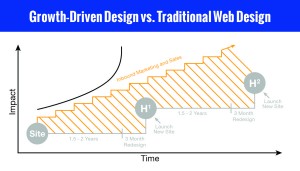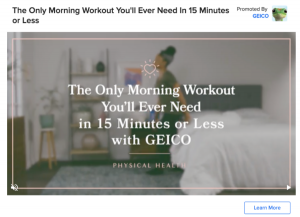Content is king. The phrase is old, but it still captures the essence of online marketing. Many marketers still focus largely on text content when they see that phrase. In reality, visual content is much more effective and more easily shared. Image-based content such as infographics and video marketing stands out like a shining beacon as marketers enter 2016. Infographics allow customers to physically see the concept the written content is trying to convey. Not only is this helpful for visual learners, but it also makes your site more attractive.
Video marketing is the wave of the future – the length of time customers are keeping their attention on content is greatly increased by video content. Even simple additions to your website like enticing photos related to the content being discussed improves readability and will positively affect your SEO results.
You must be thinking that just when you’ve conquered the ins and outs of content writing for the web, internet users stick you with another lofty expectation. But have no fear; there are dozens of simple and affordable resources to help you develop high-quality video content, and there are several avenues to incorporate video marketing into almost any brand’s marketing strategy.
Video content is the perfect way to entice new customers as well as to keep existing customers wanting more. Big companies like Twitter and Facebook turned to video marketing last year to increase their browsing times, and smaller businesses are quick to join the bandwagon. Solid video marketing content has been shown to increase a website’s likelihood of being displayed on Google’s first page.
Video content marketing is completely worth the investment, since more than 50% of marketing professionals believe video to be the type of content marketing with the best return on investment (ROI). Also, shoppers who view videos are nearly twice as likely to purchase the product compared to non-viewers.
Improvements to smartphones and increasing amounts of video content on the web have led to a drastic increase in mobile video views, and it doesn’t seem to be dropping anytime soon. Predictions about mobile video watching in the future come to the common consensus that the numbers will continue to rise.
Why Is Video Content So Popular?
Online video quickly became a means for people to satisfy their entertainment and information needs in one easy swipe. Furthermore, they aren’t forced to read paragraphs of information to find the one thing they’re trying to learn. Videos give information in a fun, entertaining way that makes absorbing information easier and more engaging for customers. Also, videos will continue to play while the user performs other tasks, like washing the dishes or writing notes. There’s no need for the user to interrupt what they’re doing to scroll through a text-based article, which promotes productivity and usability.
When it comes to the reach of content, video vastly outperforms its competitors. YouTube is the second-most visited website after Facebook, receiving more than one billion visitors every month. Adding video content to your website grants you access to this extremely large and globally spread customer base.
Your video doesn’t have to be one of the greats that amass millions of views in a day – locals or current consumers might be the only ones to view your content, but that will be enough to set your website apart from those who only partake in written content, and word-of-mouth will increase for your website because of it.
Another bonus is that the odds of hurting your business are very slim with the use of video content. Unlike social media marketing, which can easily go awry if done badly, even bad video content attracts more views than no video content at all.
What’s The Easiest Way To Create Gripping Video Content?
Creating a video that is relevant to your marketing campaign, effective in capturing an audience, and successful in conveying your message isn’t as easy as filming something and posting it on YouTube. In fact, it isn’t always easy at all – creating video content that works is something that takes time, research, and practice. But the ROI makes it worth it. Here are a few tips:
- Develop a video idea organically rather than forcing blog posts to become videos. The latter will only confuse your audience and lose their attention.
- Appreciate video content as a completely separate type of marketing and give it the full time and consideration it deserves.
- Keep video content relevant – even if you create an exciting video, it won’t matter if your audience can’t relate to it.
- Strive for creative or funny content. The same old run-of-the mill advertisements aren’t going to cut it in 2016. This is the digital age, and consumers have higher expectations since a world of entertainment is at their fingertips.
- Provide instruction. Users continue to flock to “How-To” videos to learn more about a subject of intrigue. Whether or not they follow your advice is irrelevant – many users just want to watch and absorb new information or learn life-hacking tips.
Keep in mind there are other forms of video content, like newly popularized live streaming video app Periscope, which allows people to film something on their device and stream it live directly to the internet. While live streaming may not appeal to every business, the potential applications for instant marketing are limitless, and implementing preliminary plans to incorporate live-streamed events should be part of any forward-thinking marketing strategy.
Use Photos, Graphs, And Other Visual Aids For That Extra “Something”
When an image is paired with written content compared to the content alone, the retention rate for the information is increased dramatically. Photos and illustrations break up large blocks of text, and encourage the reader to continue scrolling down instead of giving up after one glance. This explains the popularity of sites like Pinterest and Instagram, which function almost entirely through photos.
Another popular form of visual content marketing is the “Me” survey – surveys offering the user some kind of truth about themselves, accurate or not. Surveys like “Which Disney Character Are You?” attract people and collect more website hits than many other types of content strategies. A business could incorporate a similar survey on their website, attracting people with the idea they could confirm a secret hope or suspicion about themselves. Most people like to have attention focused on them. Surveys are the perfect way to achieve this while still increasing your website hits.
Memes are a good example of incredibly popular visual content. One genius decided to pair content with a related image and packaged them in an easy-to-share format, and boom – the meme was born. Content with relevant images gets 94 percent more views than content without relevant images. With staggering statistics like that, any marketing strategist would be wise to follow suit.
Overall, adding visual content to your marketing strategy will boost website views, increase SEO, get people talking, and hold customers’ interest in an era offering them the most entertainment the world has ever seen. Keeping pace with evolving trends will provide your content marketing strategy with an edge, ensuring your company and brand image remain relevant in a constantly evolving marketplace. Stay ahead of the curve and prepare to ride the wave of visual content to the top of the charts.
Hand-Picked Related Articles:
- The Ultimate Video Marketing ROI Cheat Sheet
- 8 Types of Blog Posts That Earn You More Traffic and Shares
- 5 Video Content Types & What You Should Understand About The Importance Of Video Marketing
* Adapted lead image: ![]() Some rights reserved by MIKI Yoshihito. (#mikiyoshihito)
Some rights reserved by MIKI Yoshihito. (#mikiyoshihito)
Think Outside the Text: How to Diversify Content for Better Visibility
The post Think Outside the Text: How to Diversify Content for Better Visibility appeared first on Search Engine People Blog.
(89)
Report Post








